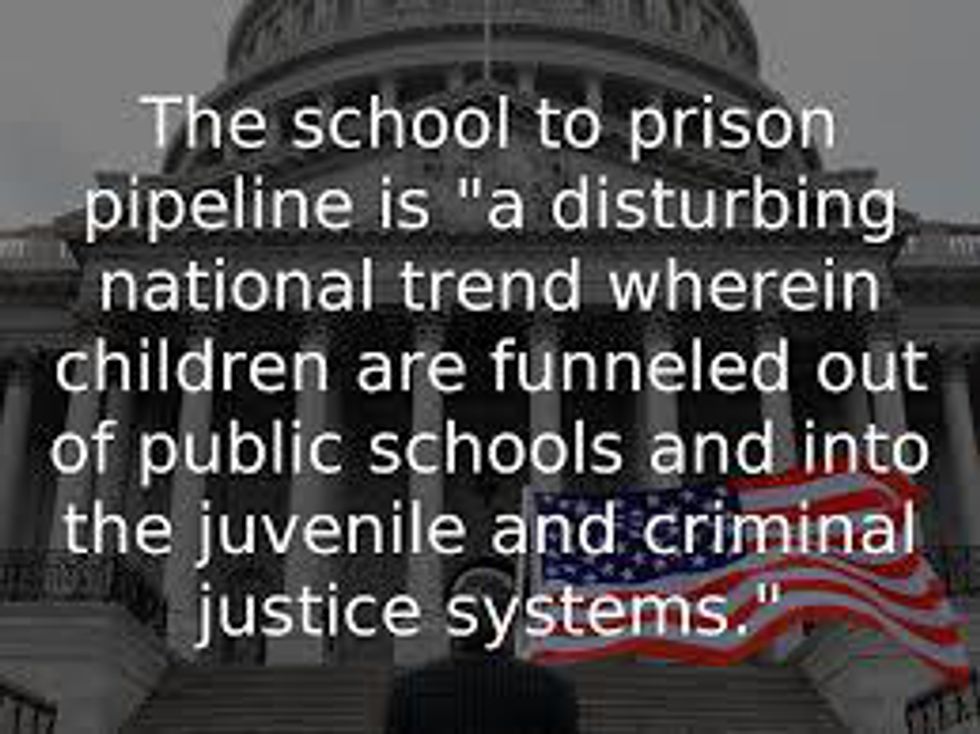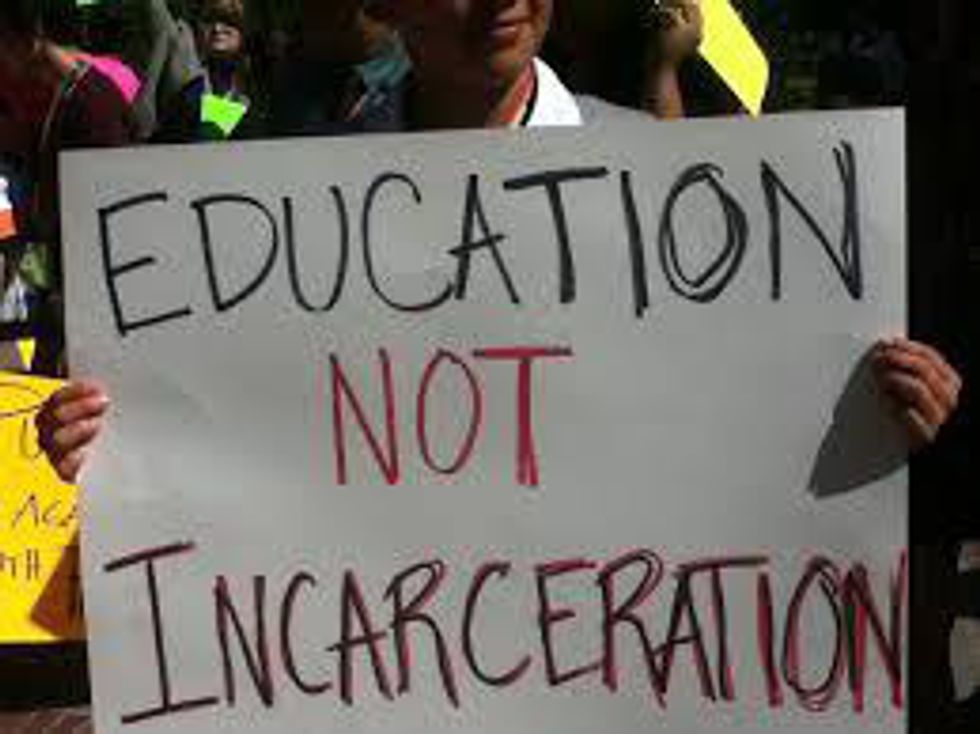Today schools are a part of the nationwide epidemic which is infecting the minds and lives of millions of children—the school-to-prison pipeline. Our schools and the media have contributed significantly into socializing children as early as infancy to behave and act in certain ways which promote being “good” little boys and girls and to obey figures of authority. By teaching young children to be “good,” we also instill the notion of being “bad” children. Thus, the othering of “bad” children begins, often following these children into their adult lives. “Bad” children are suspended, expelled, sent to juvenile delinquency centers—they are the “other” children who happen to be a part of a system in which all odds are against them. These “bad” children are labeled with a scarlet letter which then creates children who are marginalized, ignored and ultimately criminalized which is affecting youth across the nation because these same “bad” children, typically people of color, face the reality of going to prison at approximately three times higher than the “good” children.
This was the case for Tommy, a student who defied his teacher in class in an Oakland school. Under the current system in place today, Tommy would have been suspended (or even expelled) and forced to go home to a motherless household with his siblings. However, instead the incident was witnessed by Eric Butler, the school coordinator for Restorative Justice for Oakland Youth, who insisted that instead the school try a restorative approach with Tommy. Through restorative justice, Tommy was able to be seen as a person—he was humanized and shown compassion by his school officials the authority figures in his life. The underlying issue, his mother relapsing from her drug addiction and her absence from the home for three days which left Tommy to care for his siblings, caused him to be irritable and exhausted.
In the case of Cedric, a youth also from Oakland, a restorative justice circle was held after he had been suspended with school officials and members of his community present. These people empathized with Cedric and heard his needs and provided him with solutions and the support he needed—they created a network that Cedric could rely on from the point forward. He was shown compassion, love, and support from people who he thought didn’t care about him.
In both cases restorative justice helped bring healing, reconciliation, restoration and transformation. The lives of those young boys have been dramatically changed through the restorative justice process. Not only are the chances that they will succeed greatly increased, but the chances of them going to prison later on in life greatly decrease. Their perspectives have shifted and so have those of all the people in involved. Instead of allowing for the boys to be punished their needs are being heard, they feel supported, they feel like they matter.
As a youth in a vastly diverse and de facto segregated community, I have witnessed the reality of the school-to-prison pipeline. Classmates of mine whom I had grown up with are serving sentences in prison. These people who had they just been given one person, one teacher, one faculty member, who showed them compassion and support and showed them that they mattered, would not have ended in the situations they are in. They would not have been living the life that they are living. The reality is that I could have been the “bad” child. I could have ended up in prison. But I was given support. That is why I am where I am in life—because someone listened to me and showed me they cared. Had those people been given the chance to have their voices heard and their needs met, they would probably be in the same place in life I am in.
I wholeheartedly wish for the restorative approach to be brought into my community because it will change lives. It will save people from falling into the cracks of an already broken system. This is just one way of fixing the problem, but in order to do so we need to build a stronger foundation for our community, we need to stop criminalizing the youth, and cease the zero-tolerance procedures. We need to get stop school security officers from being law enforcers to student protectors. We need to be open to the change. We need to be able to show compassion, love, support, and allow for healing. This needs to be done nationwide and it has to become the standard. We need to stop putting our youth in prison. The time for that change is now.








 Going to the cinema alone is good for your mental health, says science
Going to the cinema alone is good for your mental health, says science












 women in street dancing
Photo by
women in street dancing
Photo by  man and woman standing in front of louver door
Photo by
man and woman standing in front of louver door
Photo by  man in black t-shirt holding coca cola bottle
Photo by
man in black t-shirt holding coca cola bottle
Photo by  red and white coca cola signage
Photo by
red and white coca cola signage
Photo by  man holding luggage photo
Photo by
man holding luggage photo
Photo by  topless boy in blue denim jeans riding red bicycle during daytime
Photo by
topless boy in blue denim jeans riding red bicycle during daytime
Photo by  trust spelled with wooden letter blocks on a table
Photo by
trust spelled with wooden letter blocks on a table
Photo by  Everyone is Welcome signage
Photo by
Everyone is Welcome signage
Photo by  man with cap and background with red and pink wall l
Photo by
man with cap and background with red and pink wall l
Photo by  difficult roads lead to beautiful destinations desk decor
Photo by
difficult roads lead to beautiful destinations desk decor
Photo by  photography of woman pointing her finger near an man
Photo by
photography of woman pointing her finger near an man
Photo by  closeup photography of woman smiling
Photo by
closeup photography of woman smiling
Photo by  a man doing a trick on a skateboard
Photo by
a man doing a trick on a skateboard
Photo by  two men
two men  running man on bridge
Photo by
running man on bridge
Photo by  orange white and black bag
Photo by
orange white and black bag
Photo by  girl sitting on gray rocks
Photo by
girl sitting on gray rocks
Photo by  assorted-color painted wall with painting materials
Photo by
assorted-color painted wall with painting materials
Photo by  three women sitting on brown wooden bench
Photo by
three women sitting on brown wooden bench
Photo by 
 Photo by
Photo by  Photo by
Photo by  Photo by
Photo by  Photo by
Photo by 


 people sitting on chair in front of computer
people sitting on chair in front of computer



 all stars lol GIF by Lifetime
all stars lol GIF by Lifetime two women talking while looking at laptop computerPhoto by
two women talking while looking at laptop computerPhoto by  shallow focus photography of two boys doing wacky facesPhoto by
shallow focus photography of two boys doing wacky facesPhoto by  happy birthday balloons with happy birthday textPhoto by
happy birthday balloons with happy birthday textPhoto by  itty-bitty living space." | The Genie shows Aladdin how… | Flickr
itty-bitty living space." | The Genie shows Aladdin how… | Flickr shallow focus photography of dog and catPhoto by
shallow focus photography of dog and catPhoto by  yellow Volkswagen van on roadPhoto by
yellow Volkswagen van on roadPhoto by  orange i have a crush on you neon light signagePhoto by
orange i have a crush on you neon light signagePhoto by  5 Tattoos Artist That Will Make You Want A Tattoo
5 Tattoos Artist That Will Make You Want A Tattoo woman biting pencil while sitting on chair in front of computer during daytimePhoto by
woman biting pencil while sitting on chair in front of computer during daytimePhoto by  a scrabbled wooden block spelling the word prizePhoto by
a scrabbled wooden block spelling the word prizePhoto by 








